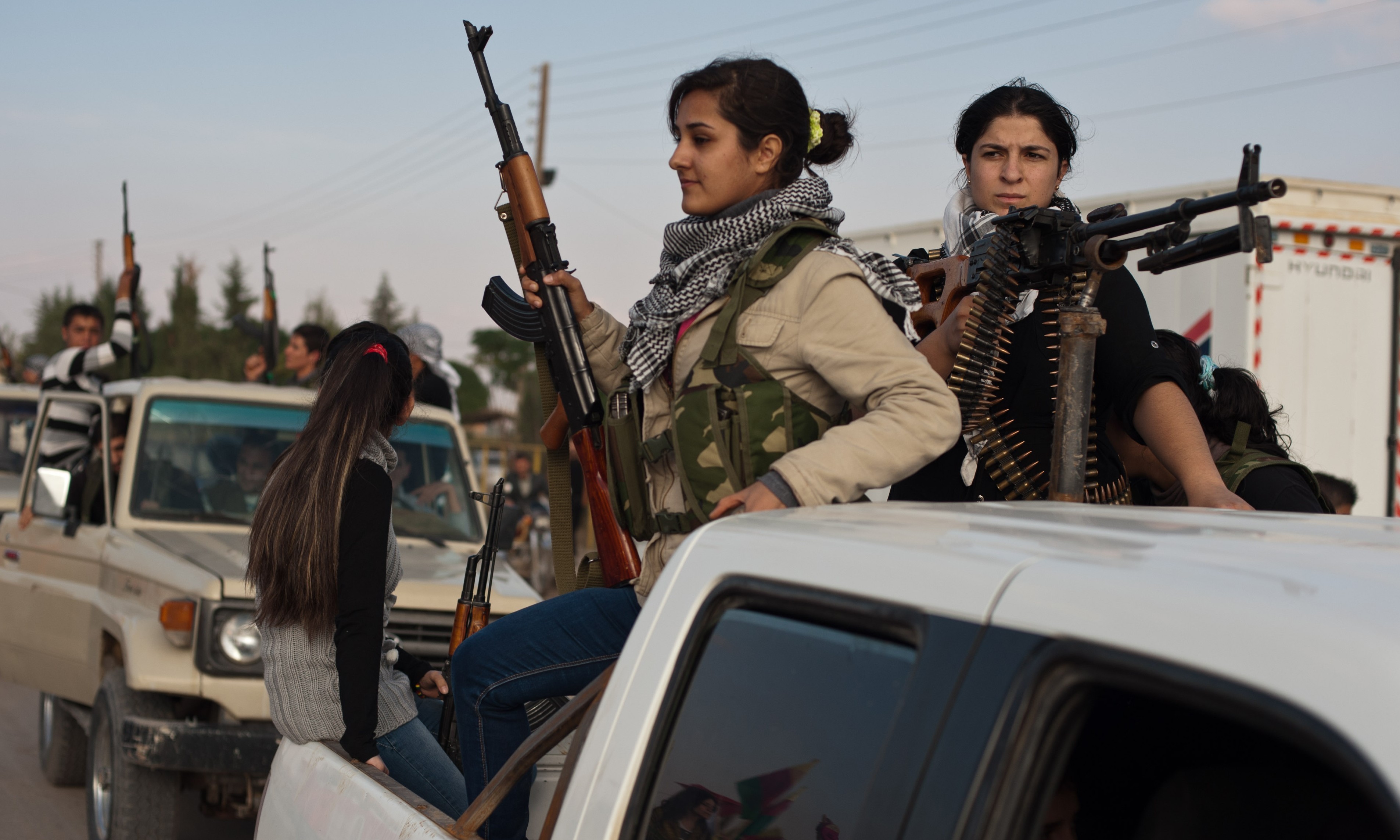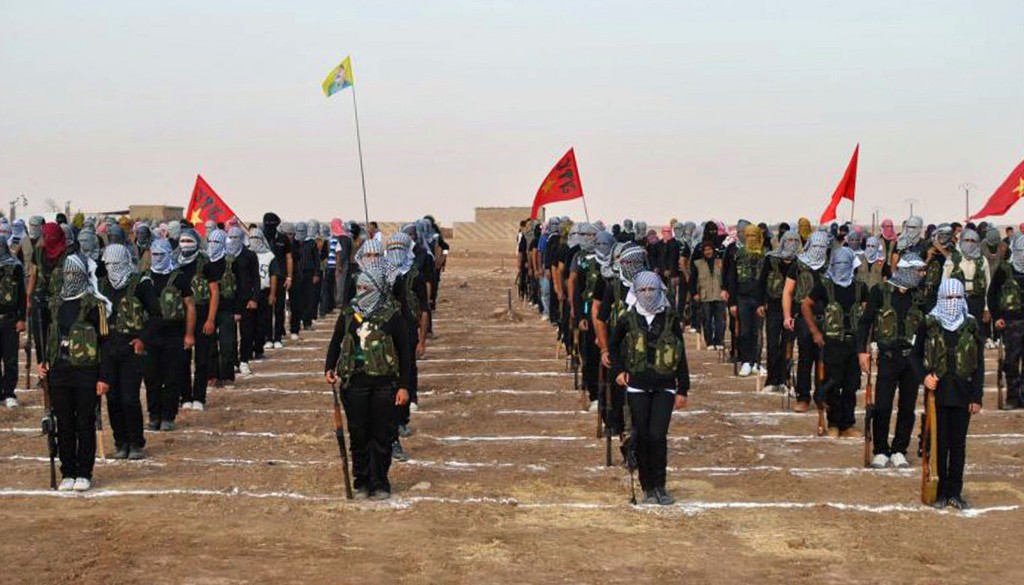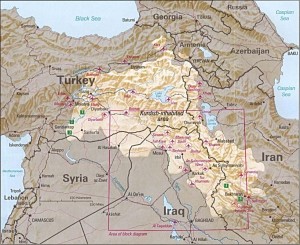by Hassan Reyes
Within the murky and increasingly violent landscape of the civil war in Syria, there is a tough reality for progressive, internationalist-minded people in identifying an ally. Given that the lion’s share of fighting continues to be between the Syrian government and military (which, up until prior to the Arab Spring, had been collaborating with the ‘War on Terror’) and Western imperialist-backed rebels (including operatives and fronts with recognized ties to Al Qaeda), the prospects for Syrians appear bleak. This is especially true if the US and their NATO allies, including Canada, get their way and a bombing campaign, comparable to one that was unleashed on Libya, gets authorized.
However, an overlooked factor and player, within this conflict, are the over 2 million Kurds in Syria’s North-east region. Their role as political actors provides not only some much needed insight into the devolution of this internal conflict, but also some hope for a peaceful outcome that will benefit the majority of Syrians.
The Kurds in Syria
Representing roughly 10% of Syria’s population, Syrian Kurds are concentrated on the border of Turkey and Iraq, which represent the historic concentrations of Kurds in the region.
Kurdish settlements in the north of Syria can be traced to the 11th century and increased throughout the period of the Ottoman Empire. When the French took over the region following the defeat of the Ottoman in World War I, the Kurds were provided with rights, by the French, in order to recruit minorities into its military ranks.
Once Syria was declared a Republic, Kurds were largely stripped of their cultural and social rights, including citizenship, following the 1962 Jazira census and the Arabization of the north of Syria in the following years. Since being stripped of citizenship, many Syrian Kurds, who were now declared ‘alien’, lost numerous rights, such as the dispossession of land. Current estimates of stateless Syrian Kurds range from 200 000 – 400 000.
Since its declaration as an Arab Republic in 1961, Syrian governments that followed failed to recognize and reinstate cultural and social rights for Kurds, including language rights. Mass demonstrations, asserting these rights, often ended with repression against the Kurdish masses. Examples of this would be the Newroz protests in 1984, which lead to 4 people being killed by Syrian security forces, as well as the Qamishli massacre in 2004, where 65 people were killed and more than 160 were injured in riots that followed a soccer match between a Kurdish-supported team and an Arab-supported team.
Kurdish organizations, most of which had remained illegal, were among the first to join the demonstrations in Syria, in 2011. Representative for the Kurdish Workers Party (PKK) in Latin America, Mehmet Ali Dogan, confirmed that the organizations allied with the PKK operating in Syria “were part of the initial demonstrations”. In the latter half of that year, a Syrian Kurd politician, Maashal Tammo, was assassinated in his apartment. While Tammo’s family blamed the Syrian government, the PKK believed that this type of assassination had the trademark of a Turkish operation.
Since the beginning of 2012, two major camps have evolved among Kurdish organizations in Syria. The Kurdish National Council (KNC), formed in Iraqi Kurdistan, is part of the Syrian National Council (western recognized political opposition) and seeks Kurdish autonomy. The Kurdish Democratic Union Party (PYD), on the other hand, does not want to set up an independent Kurdish state, but rather follows the political line of the PKK, which seeks to establish ‘democratic autonomy’ within the Syrian state.
“We see that the imperialists want to Balkanize (divide) the Middle East in order to make it easier to control. We are communists, internationalists, we want to free not only Kurds but all people,” said Ali Dogan, explaining why the PKK and PYD have refused to join the SNC and reject the idea of declaring an independent state in Syria. “We feel that this should be an opportunity for Syria, to become an example for the Middle East, to be the Venezuela of the Middle East.”
While remaining officially in opposition to the Syrian government, the PYD has distanced themselves from US-backed opposition and the Free Syrian Army, stating that “although the opposition likes to portray itself as revolutionary and democratic, its actions have resembled nothing like it.”
Currently, the PYD and its Peoples Protection Units (YPG) control a large portion of North-East Syria, administering to these areas with the creation of popular assemblies. At the same time, protecting Kurdish civilians and securing the borders against mercenaries and supplies coming from Turkey and Iraq, particularly those affiliated with the Al Nusra front and the Islamic State of Iraq.
In a statement, deploring the sectarian violence being fomented in Kurdish areas by these foreign-backed mercenaries, the PYD states “The Kurds and the democratic movement in Syria have successfully managed to administer themselves democratically and peacefully and they have actively sought to contribute to democratic, peaceful change inside Syria… We consider a comprehensive political settlement to be an effective resolution to end the Syrian crisis and its brutal civil war.”
While the US and Canada work furiously to advance the bloodshed in Syria, by proposing bombing and continuing to finance and arm an opposition that includes Al Qaeda-linked groups and organizations that are committing atrocities on the ground, the actions and demands of groups like the PYD go unnoticed. PYD proves that the people, once organized and without external meddling, can solve their own problems and start building a future for themselves.
Comments


